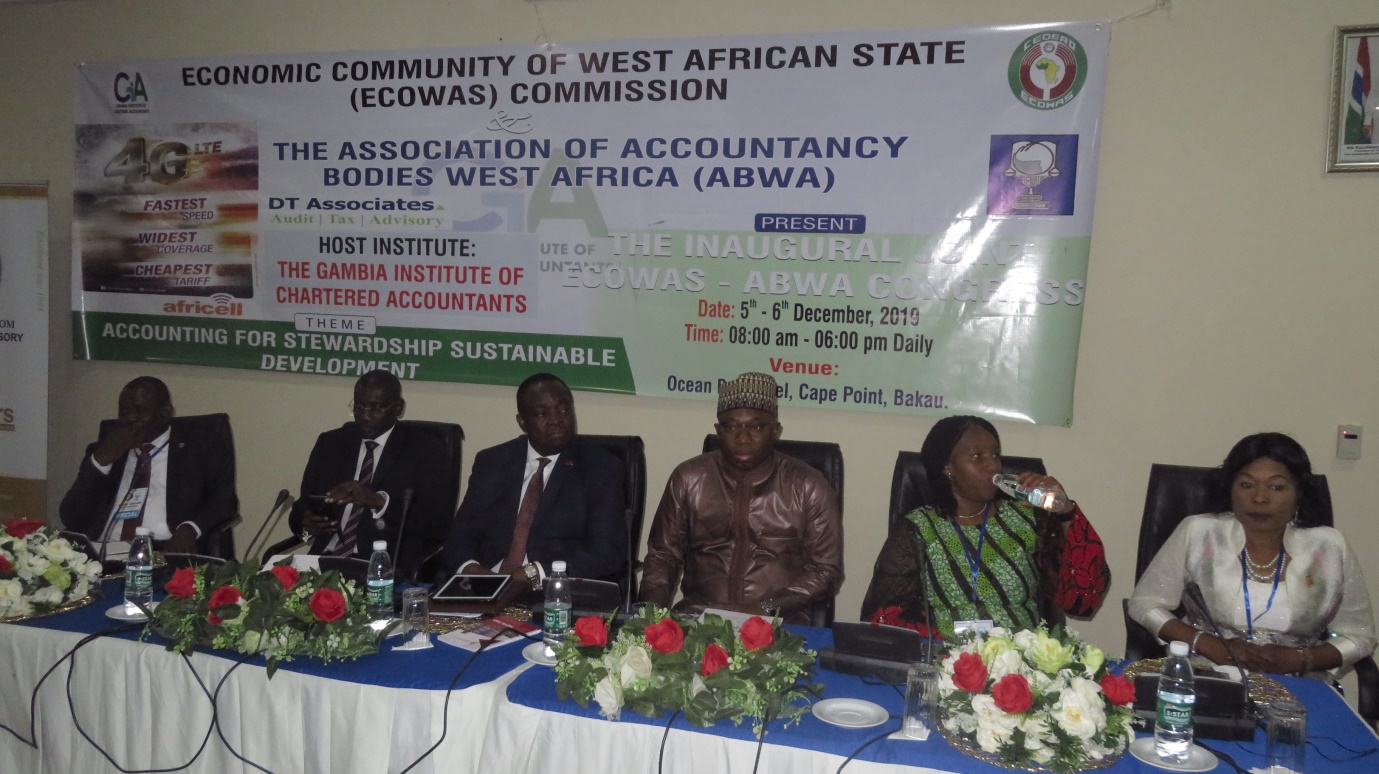By Musa S. Sheriff
Minister of Finance and Economic Affairs Mambury Njie said the contribution of professional accountants could not be overemphasized in the implementation of ECOWAS Vision 2050.
The minister was addressing the opening session of the joint congress of the Economic Community of West African States (ECOWAS) and the Association of Accountancy Bodies in West Africa (ABWA) in Bakau, Cape Point on Thursday.
Njie said the theme chosen for the two-day congress -“Accounting for stewardship and sustainable development” – was in tune with the vision of Gambian President Adama Barrow as enshrined in the country’s national development plan 2018-2021.
The vision aims at “delivering good corporate governance and accountability, social cohesion, and national reconciliation and a revitalized and transformed economy for the wellbeing of all Gambians“.
He said the collaboration of ECOWAS with ABWA was borne out of the realization of its objectives to promote cooperation and integration in all fields of economic activity, particularly industry, natural resources, commerce, monetary and financial matters by ensuring professional accountants in the sub-region.
ECOWAS, he said, was positioned to drive accountability and transparency in governance, promote best practices in financial reporting and support their various governments to create value in the sub-region.
He said the contribution of professional accountants could not be overemphasized in the implementation of ECOWAS Vision 2050 in public financial management reforms.
“You are all viewers of the strides being taken by ECOWAS and its member-states to promote further economic and financial integration with the view to promote trade, free movement of goods and people based on the two pillars of economic and monetary union.
“The recent ratification of the Africa Continental Free Trade Area (AFCTA) Treaty by almost all countries is a further impetus for ECOWAS and member-states to re-position economically to transition from our internal market of 350 million people to 1.3 billion African markets not to mention the global economy,” he pointed out.
Njie further said the potentials embedded within intra-African trade far outweighed the benefits currently being derived from ECOWAS members individual bi-bilateral trade agreements with established blocks such as the European Union, USA and the Asian Countries.
“Accountants have a pivotal role to play in the realization of these major transformational initiatives to benefit our people,” he noted.
Professor Kwame Adom-Frimpong, ABWA president, said accountants were charged with the responsibility of providing the trustworthy financial information needed to make critical resource allocation decisions.
“The role of accountants in enhancing the communication between companies, their investors and management is critical. Directors and management rely upon financial information to make strategic decisions, create sustainable business value and invest for the future.
“The work of accountants creates an objective basis for measuring the stewardship performance,” he added.
With a population of over 350million people and many diverse natural resources, he said the West African economy was yet to make its mark in the global economic development space.
“The economic growth rates of the various countries are insufficient to make significant reduction in poverty levels. The statics on the status of the sub-region on the implementation of the UN sustainable Development Goals are not inspiring,” he pointed out.
Adom-Frimpong also said the world had moved on from manufacturing to the export of intangible products and services as part of their strategies to create more value.
He pointed out that the sub-region still practised subsistence agriculture, exported primary products, earned little income, experienced poor savings, attracted poor investments and therefore “remains a poor sprinter in the global economic development race”.
“The challenge of infrastructural development and citizens’ access to the basic needs of life remains profound. The situation is further worsened by leadership challenges at all levels. The narrative about West Africa should and must change,” he said.
“Whether at the corporate or public level, accounting occupies a premier position in governance. Besides its confirmatory and predictive values, it provides information on the impact of decisions of persons in fiduciary position on the resources entrusted to them for management.
“Its practitioners lend credence to stewardship reports prepared by managers which are presented to stakeholders either at the annual general meeting or during general elections,” he stated.
The ABWA, inaugurated in 1982 as a regional organization for the accountancy profession in West Africa, was registered as body corporate in 1994 in Nigeria.
It is a non-profit making, non-political and non-governmental association and one of the four acknowledged accountancy groupings recognized by the International Federation of Accountants.





